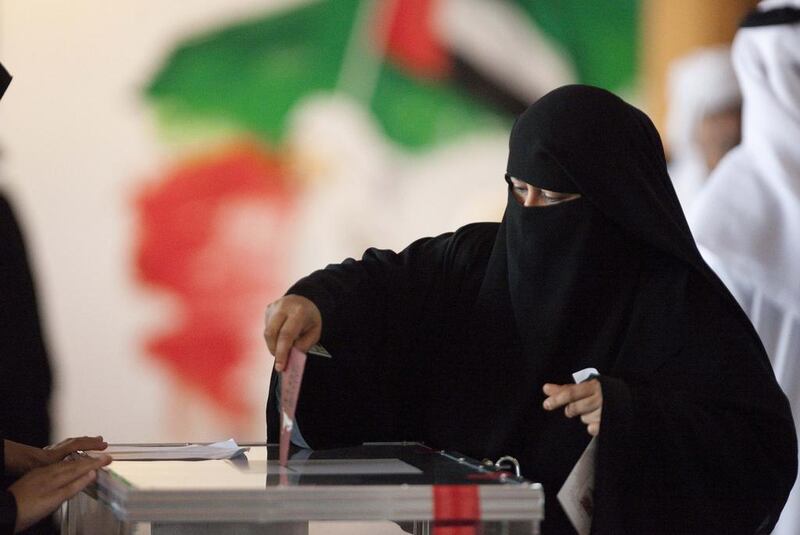One of the biggest changes in this year’s Federal National Council election will be the introduction of one vote per person. But how this will affect the election outcome remains uncertain.
In the previous two elections, each voter could vote for half the seats allocated to their emirate. For a voter in Abu Dhabi, this meant they could vote for up to four candidates, because the emirate had eight seats on the council. The same applied to Dubai.
In Sharjah and Ras Al Khaimah, each voter could vote for three candidates, and in Ajman, Fujairah and Umm Al Quwain, it was two candidates.
Because this is only the third election, it is difficult to predict how the change will affect the outcome, particularly because the electoral college list is expected to increase drastically this year to give voting rights to the largest number of citizens yet. In 2006, there were just 6,595 eligible voters, but that increased to 129,274 in 2011.
However, analysis of the UAE’s past two elections offer insight into a possible outcome: more tribes represented.
At the FNC election in 2011, The National was present in all the country’s polling stations and spoke to dozens of voters as they left the voting booths.
While many were reluctant to reveal their selections before winners were announced, several said they had chosen people based on their tribal affiliation.
Two female voters in Abu Dhabi from Al Ameri family said they naturally gave all their votes to members of that tribe.
Another voter said he voted for a “deserving” candidate, and one from his tribe.
Many felt obliged to support members of their tribe. Not doing so, they believed, would be a form of disloyalty, even though no one would know.
As a result, three of the four elected seats in Abu Dhabi went to Al Ameri tribe members.
In Ras Al Khaimah, two of the three elected seats went to members of Al Teneiji family and, in Ajman, two of Al Shamsi tribe were elected.
Appeals were made by losing candidates who saw tribal domination as unfair. They believed a larger representation should have been made and such an outcome vetoed. Such appeals had no grounds because winners won fair and square.
The subsequent appointment of the 20 other council members, to an extent, helped to even out tribal representatives.
This year, with just one vote per voter, those who do wish to give their vote to a member of their tribe can pick only one.This will make tactical voting – opting for someone they would not usually support to stop another from winning – far more likely, as voters try to ensure their ballots aren’t scattered across several of their tribesmen.
Certain tribes may even want to choose one member of the clan and lobby for them, which would have the knock-on effect of healthy internal competition.
One vote will also mean voters will have to decide whether to entrust a relative or someone else they may deem more fitting. Another effect of one vote could be raising the election turnout rate, which was a disappointing 28 per cent in 2011.
Dr Saeed Al Ghafli, a member of the National Election Committee, said this was one of the intentions for the change.
Now that each vote could make all the difference for a candidate, it follows that candidates would invest more time convincing voters of their worthiness. And now with fewer choices to make on polling day, voters may feel less intimidated by the long list of candidates.
newsdesk@thenational.ae
Ola Salem is a freelance journalist and a former political correspondent for The National.






